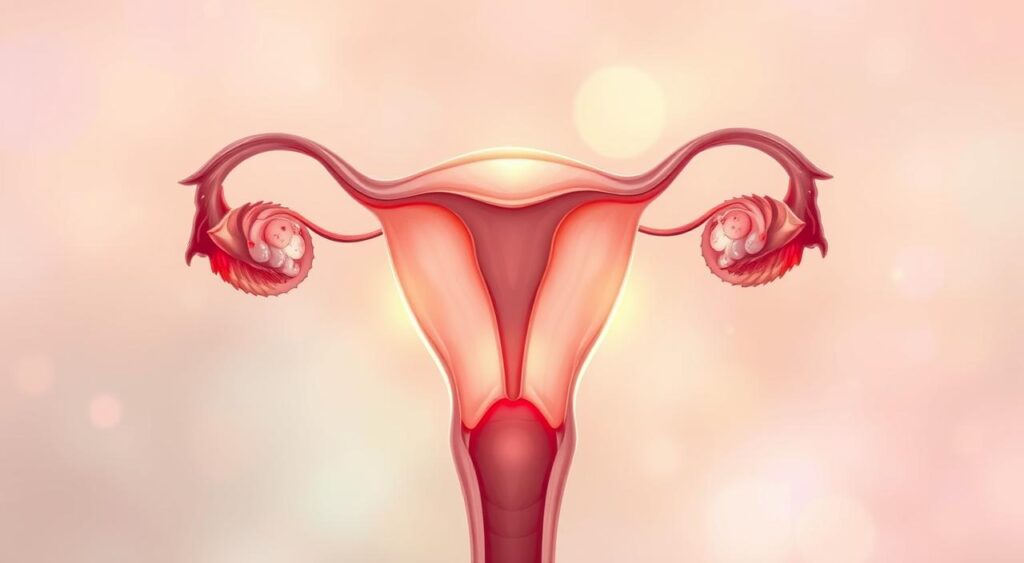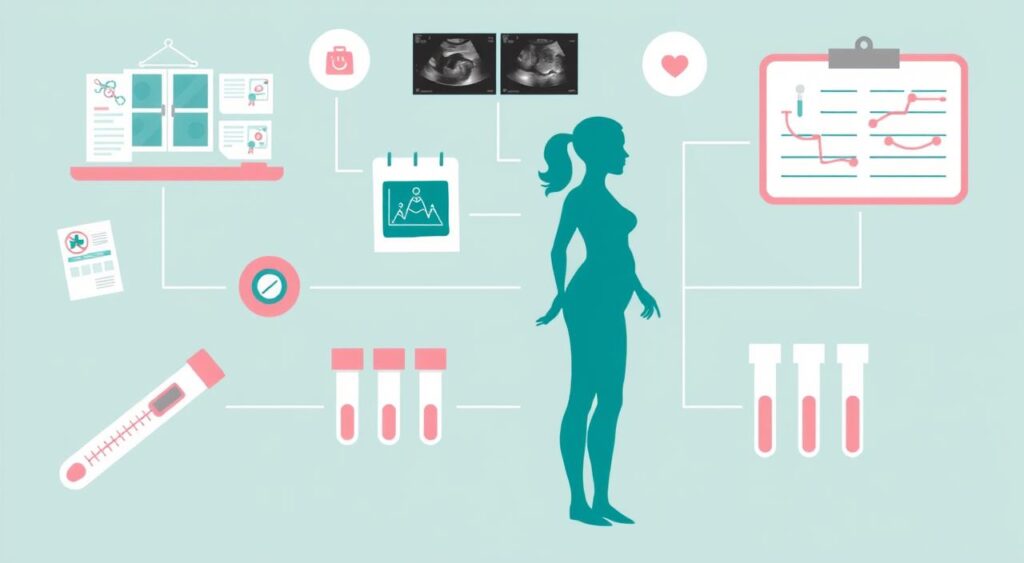Explore the key facts about Polycystic Ovary Syndrome (PCOS) and discover effective strategies for optimal health.
Polycystic ovary syndrome (PCOS): This common endocrine disorder can affect women’s health a lot. Symptoms include irregular periods and cysts on the ovaries. If not treated, it can cause serious health problems.
It’s important to know about PCOS treatment and early diagnosis. This helps manage the condition well.
PCOS is a big concern for women’s health. It affects not just physical health but also emotional well-being. Hormonal imbalances can cause weight gain, acne, and too much hair growth. Recognizing symptoms and getting medical help is the first step to better health.

With the right treatment, women can control their symptoms. This reduces the risk of other health problems. Staying updated on PCOS research and treatments helps women take charge of their health.
Key Takeaways
- Polycystic ovary syndrome (PCOS) is a common endocrine disorder affecting 5 million women in the US.
- PCOS symptoms can include irregular menstrual cycles, cysts on the ovaries, and hormonal imbalances.
- Early diagnosis and PCOS treatment are crucial for effective management of the condition.
- Hormonal imbalances are a key characteristic of PCOS, leading to a range of symptoms.
- Proper medical care and lifestyle changes can help manage PCOS symptoms and improve overall health.
- Staying informed about the latest developments in PCOS research and treatment options is essential for effective management.
Understanding Polycystic Ovary Syndrome (PCOS)
Polycystic Ovary Syndrome, or PCOS, is a complex hormonal disorder that affects women of reproductive age. It’s important to understand what PCOS is, how common it is, and its impact on women’s health. PCOS causes a variety of symptoms, including irregular menstrual cycles and infertility. These symptoms can greatly affect a woman’s quality of life.
Diagnosing PCOS can be tricky because symptoms vary from woman to woman. PCOS diagnosis often involves a physical exam, medical history, and lab tests. Knowing the PCOS causes is key to managing the condition. Treatment may include lifestyle changes, medication, or a mix of both.
- Hormonal imbalances, which can lead to acne, excess hair growth, and weight gain
- Infertility, which can be a significant concern for women with PCOS
- Metabolic problems, such as insulin resistance and an increased risk of developing type 2 diabetes
Managing PCOS effectively requires a holistic approach. This includes physical, emotional, and psychological aspects of the condition. By grasping the complexities of PCOS and its PCOS causes, women can work with their healthcare providers. Together, they can create a personalized plan for PCOS diagnosis and treatment. This can greatly improve a woman’s overall health and well-being.
Common Signs and Symptoms of PCOS
Polycystic ovary syndrome symptoms vary a lot among women. This makes it key to catch it early and act fast. Women with PCOS often have irregular menstrual periods. They might also gain weight, get acne, and grow more hair than usual.
Knowing these signs is vital for spotting PCOS and getting help. Some women have cysts on the ovaries, seen on ultrasound. Here are some common signs and symptoms of PCOS:
- Irregular menstrual periods
- Weight gain
- Acne
- Excess hair growth
- Cysts on the ovaries
Spotting these symptoms is the first step to getting help. Remember, every woman with PCOS is different. Not all will show all these signs. But knowing them helps women take control of their health.
Acting early can greatly improve life for women with PCOS. By knowing the common signs, women can get the right treatment. This helps manage their condition and boosts their health.
The Root Causes Behind PCOS Development
Polycystic ovary syndrome (PCOS) is a complex condition. Understanding its root causes is key to managing it well. Research shows that hormonal imbalances play a big role in PCOS. These imbalances can cause ovulation problems, insulin resistance, and high androgen levels, leading to PCOS.
Several factors contribute to PCOS, including:
- Genetic factors: Family history can increase the risk of developing PCOS, indicating a possible genetic link.
- Hormonal imbalances: As mentioned earlier, hormonal imbalances are a key contributor to PCOS causes.
- Environmental influences: Lifestyle and environmental factors, such as diet and stress, can also impact the development of PCOS.
Understanding how these factors work together is crucial. It helps in finding effective treatments and management strategies. By knowing the impact of genetics, hormonal imbalances, and environment, people with PCOS can manage their condition better. They can strive for hormone balance and overall well-being.
Managing PCOS well involves tackling these underlying factors. Making smart lifestyle choices is part of it. This way, people can lower their risk of related health problems. They can also improve their quality of life.
| Factor | Description |
|---|---|
| Genetic factors | Family history and genetic predisposition |
| Hormonal imbalances | Issues with ovulation, insulin resistance, and androgen levels |
| Environmental influences | Lifestyle and environmental factors, such as diet and stress |
Diagnostic Process and Testing Methods
The PCOS diagnosis process includes clinical evaluation, medical history, and diagnostic tests. A healthcare provider will start by doing a physical exam and taking a detailed medical history. They will talk about symptoms, menstrual history, and any health issues.
An ultrasound is a key test for PCOS. It helps find cysts on the ovaries. Blood tests to check hormone levels are also important. They help confirm a PCOS diagnosis and rule out other conditions.

- Hormone level tests to check for androgen excess and other hormonal imbalances
- Glucose tolerance tests to assess insulin resistance
- Lipid profiles to evaluate cholesterol and triglyceride levels
Getting a PCOS diagnosis early is crucial. It helps start the right treatment quickly. Knowing about diagnostic tests helps women understand their journey to a proper PCOS diagnosis.
| Test | Purpose |
|---|---|
| Hormone level tests | To check for androgen excess and other hormonal imbalances |
| Glucose tolerance tests | To assess insulin resistance |
| Lipid profiles | To evaluate cholesterol and triglyceride levels |
Treatment Options and Medical Interventions
Managing PCOS requires a detailed treatment plan. This plan may include medication options to control menstrual cycles and reduce symptoms. It also aims to boost fertility. Treatment often combines lifestyle changes with medical help, tailored for each person’s needs.
Hormone therapy is a key part of PCOS treatment. It tries to balance hormonal imbalances that lead to the condition. Birth control pills or other meds might be used to regulate hormones. Sometimes, medication options help stimulate ovulation or improve insulin sensitivity.
- Medications to regulate menstrual cycles and reduce androgen levels
- Hormone therapy to balance hormonal imbalances
- Lifestyle changes, such as diet and exercise, to improve overall health and manage symptoms
It’s crucial to work with a healthcare provider to find the right treatment. By using PCOS treatment options like medication options and hormone therapy, people can manage their symptoms well. This improves their quality of life.
The PCOS Diet: Nutrition for Hormone Balance
Nutrition is key in managing PCOS. Certain diets help balance hormones and ease symptoms. A well-thought-out PCOS diet is a big help in managing PCOS, alongside other treatments. It focuses on whole foods, balanced carbs, and healthy fats.
Important parts of a nutrition for PCOS plan include:
- Whole grains, such as brown rice, quinoa, and whole-wheat bread
- Lean protein sources, like poultry, fish, and legumes
- Healthy fats, including avocado, nuts, and olive oil
- Fresh fruits and vegetables, rich in fiber and antioxidants
A PCOS diet should also have balanced carbs, avoiding refined sugars. Healthy fats, like omega-3s, reduce inflammation and balance hormones. Adding these to a nutrition for PCOS plan can help manage symptoms and improve health.

By choosing the right foods, people with PCOS can actively manage their condition. A well-planned PCOS diet can balance hormones, improve symptoms, and boost overall health. It’s crucial to talk to a healthcare provider or dietitian to create a personalized nutrition for PCOS plan that fits individual needs and goals.
Exercise and Physical Activity Guidelines
Regular exercise is key for women with PCOS. It helps manage weight, improves insulin use, and lowers health risks. Finding fun and lasting activities is important for exercise for PCOS.
Guidelines suggest 150 minutes of moderate exercise weekly. This includes brisk walks, cycling, or swimming. Adding strength training and flexibility exercises also benefits women with PCOS.
Best Types of Exercise for PCOS
- Aerobic exercises: brisk walking, cycling, swimming
- Strength training: weightlifting, bodyweight exercises
- Flexibility exercises: yoga, Pilates, stretching
Finding an exercise routine that fits your life is crucial. Start slow and increase workout intensity and time. Getting advice from a healthcare provider or fitness expert can help create a tailored plan.
Creating an Exercise Routine
When planning your exercise, think about your schedule, likes, and fitness level. Setting achievable goals and tracking progress keeps you motivated. Adding physical activity improves health and quality of life for women with PCOS.
| Exercise Type | Frequency | Duration |
|---|---|---|
| Aerobic exercise | 3-4 times per week | 30-60 minutes |
| Strength training | 2-3 times per week | 20-30 minutes |
| Flexibility exercises | 2-3 times per week | 10-20 minutes |
Managing PCOS and Fertility
For many women with PCOS, getting pregnant is a big worry. PCOS and fertility problems often go together. But, with the right help, it’s possible to have a successful pregnancy.
Women with PCOS might find it hard to get pregnant because of hormone imbalances and ovulation issues. But, there are many ways to improve your chances of getting pregnant. Some women have even gotten pregnant naturally without any medical help.
Natural Conception with PCOS
To boost your chances of getting pregnant naturally, try making some lifestyle changes. Keep a healthy weight, eat well, and exercise regularly. These steps can help balance your hormones and improve your fertility.
Fertility Treatment Options
If natural conception is not working, there are other options. These include:
- In vitro fertilization (IVF)
- Medicated fertility treatments
- Surrogacy
- Egg donation
It’s important for women with PCOS to talk to a fertility specialist. They can help find the best treatment for you. With the right support, many women with PCOS can overcome their fertility challenges and become mothers.
Understanding your options and getting professional advice can help women with PCOS. Fertility treatments offer hope and guidance for those who want to conceive. With the right approach, many women with PCOS can start a family.
Long-term Health Considerations
Women with PCOS face a higher risk of long-term health issues like diabetes and heart disease. Regular health check-ups and sticking to treatment plans are key to lowering these risks.
Some PCOS complications include:
- Diabetes
- Cardiovascular disease
- Mental health issues, such as depression and anxiety
Knowing about these risks and taking action early is vital.
Women with PCOS can lower their risk by making lifestyle modifications
PCOS complications can greatly affect a woman’s life quality. So, it’s important to work with a healthcare provider. They can help create a plan to manage PCOS and prevent long-term health issues.
| PCOS Complication | Description |
|---|---|
| Diabetes | A metabolic disorder characterized by high blood sugar levels |
| Cardiovascular disease | A condition that affects the heart and blood vessels, increasing the risk of heart attack and stroke |
Mental Health and Emotional Support
Living with PCOS can really affect your mental health. It’s key to tackle emotional challenges. Women with PCOS often feel anxious, depressed, and have low self-esteem. The right emotional support can help manage these feelings.
Stress management and self-care are good coping strategies. Having a support system, like family, friends, and groups, can make you feel understood. Professional help, like therapy, can also guide you in managing mental health and PCOS.
Here are some ways to deal with PCOS’s emotional side:
- Try mindfulness and meditation
- Do physical activities like yoga or walking
- Join support groups or online forums
Recognizing the need for emotional support and seeking help is crucial. Women with PCOS can manage their condition better and improve their well-being.
| Support System | Description |
|---|---|
| Family and Friends | Offer emotional support and understanding |
| Support Groups | Connect with others who have PCOS |
| Professional Help | Provides guidance and tools for mental health |
Conclusion: Living Well with PCOS
PCOS brings its own set of challenges, but women can manage their symptoms and live well. It’s important to stay proactive about your health. Look for treatment options that work for you and make lifestyle changes that help balance hormones.
Understanding PCOS and its causes is key. Keep an eye on your symptoms and work with your healthcare team. You’re not alone; many women are managing PCOS and doing great.
Stay up-to-date with PCOS research and find support when you need it. Having a positive mindset is crucial. With the right approach, you can live well with PCOS and reach your health goals. Keep moving forward, and know a fulfilling life is possible.
FAQ
Q: What is Polycystic Ovary Syndrome (PCOS)?
A: PCOS is a common disorder in women of childbearing age. It causes hormonal imbalances and irregular periods. It also leads to the growth of small cysts on the ovaries.
Q: How common is PCOS?
A: PCOS affects about 5-10% of women of childbearing age worldwide. It’s one of the most common endocrine disorders.
Q: What are the main symptoms of PCOS?
A: Symptoms include irregular periods, too much hair growth, acne, weight gain, and trouble losing weight. These are common signs of PCOS.
Q: What causes PCOS?
A: The exact cause of PCOS is still unknown. But it’s thought to be due to genetics, hormonal imbalances, and environmental factors. High levels of male hormones play a big role.
Q: How is PCOS diagnosed?
A: Doctors use a patient’s medical history, physical exam, blood tests, and ultrasound to diagnose PCOS. This helps rule out other conditions.
Q: What are the treatment options for PCOS?
A: Treatments include medications to manage symptoms and hormonal imbalances. Lifestyle changes like a healthy diet and exercise are also key.
Q: Does PCOS affect fertility?
A: Yes, PCOS can make it harder to get pregnant due to hormonal imbalances and irregular ovulation. But, there are treatments to help with fertility.
Q: What are the long-term health risks associated with PCOS?
A: Women with PCOS are at higher risk for type 2 diabetes, heart disease, and endometrial cancer. Managing PCOS through lifestyle changes can help reduce these risks.
Q: How can emotional and mental health challenges related to PCOS be addressed?
A: PCOS can lead to anxiety, depression, and low self-esteem. Getting support from healthcare providers, counselors, and support groups can help manage these issues.
